|
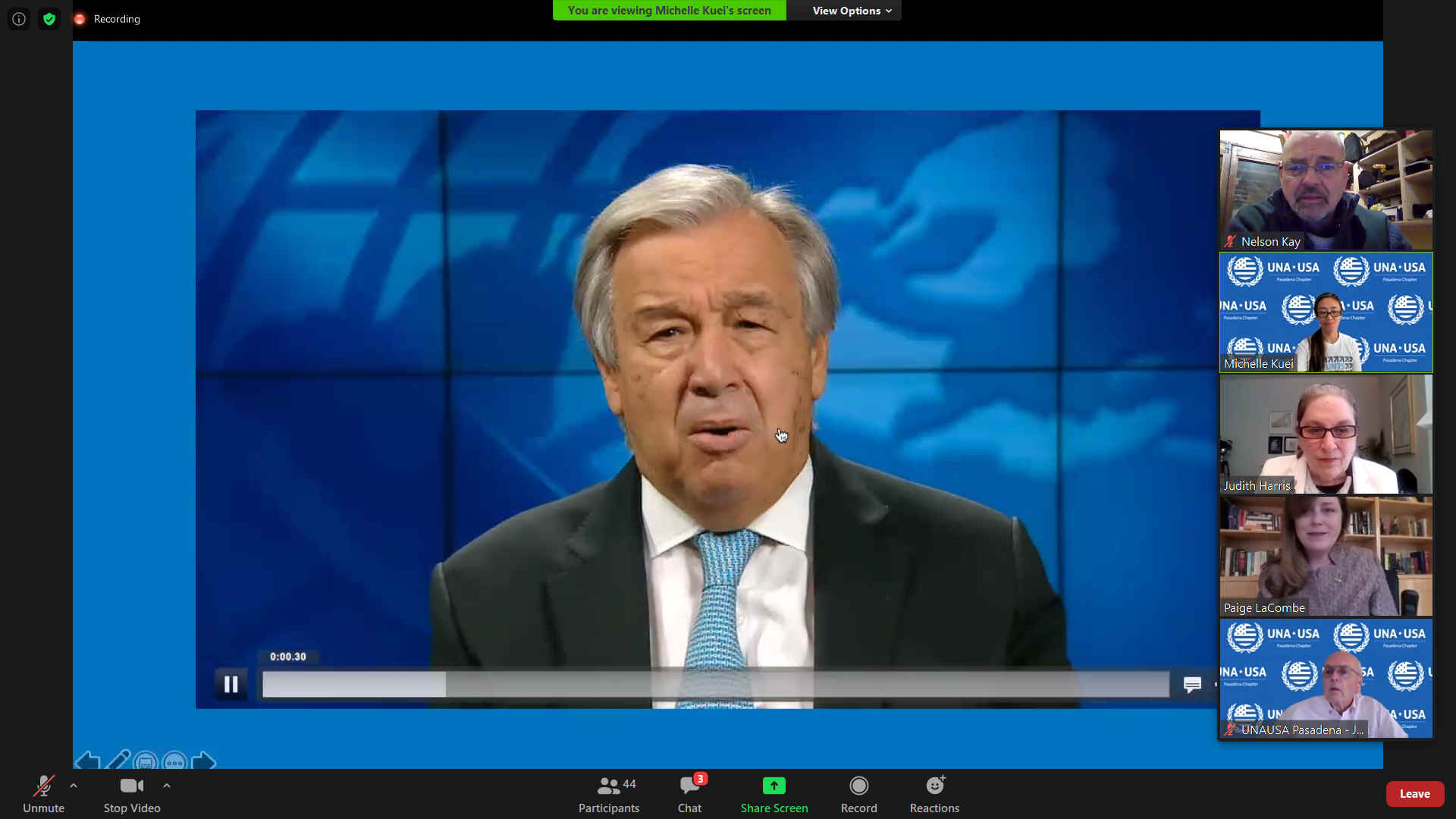
75TH
ANNIVERSARY
- António Guterres giving a
keynote speech on the 24th of October 2020. The United Nations was
seventy-five years strong on this day.
The United Nations announced on Saturday
(24-10-20) that 50 countries have ratified a UN treaty to ban nuclear weapons triggering its entry into force in 90 days, a move hailed by anti-nuclear activists but strongly opposed by the United States and the other major nuclear powers.
As of Friday, the treaty had 49 signatories, and the United Nations said the 50th ratification from Honduras had been received.
UN Secretary-General António Guterres commended the 50 states and saluted "the instrumental work" of civil society in facilitating negotiations and pushing for ratification, UN spokesman Stephane Dujarric said.
The UN chief said the treaty’s entry into force on January 22, 2021, culminates a worldwide movement "to draw attention to the catastrophic humanitarian consequences of any use of nuclear weapons" and "is a tribute to the survivors of nuclear explosions and tests, many of whom advocated for this treaty."
Guterres is quoted as saying the treaty "represents a meaningful commitment towards the total elimination of nuclear weapons, which remains the highest disarmament priority of the United Nations."
Beatrice Fihn, executive director of the International Campaign to Abolish Nuclear Weapons, the 2017 Nobel Peace Prize-winning coalition whose work helped spearhead the nuclear ban treaty, said: "This moment has been 75 years coming since the horrific attacks on Hiroshima and Nagasaki, and the founding of the UN which made nuclear disarmament a cornerstone."
"The 50 countries that ratify this Treaty are showing true leadership in setting a new international norm that nuclear weapons are not just immoral but illegal," she said.
The 50th ratification came on the 75th anniversary of the ratification of the UN Charter which officially established the United Nations and is celebrated as UN Day.
"The United Nations was formed to promote peace with a goal of the abolition of nuclear weapons," Fihn said. "This treaty is the UN at its best — working closely with civil society to bring democracy to disarmament."
The United States had written to treaty signatories saying the Trump administration believes they made "a strategic error" and urged them to rescind their ratification.
The US letter, obtained by The Associated Press, said the five original nuclear powers - the US, Russia, China, Britain and France - and America’s NATO allies "stand unified in our opposition to the potential repercussions" of the treaty.
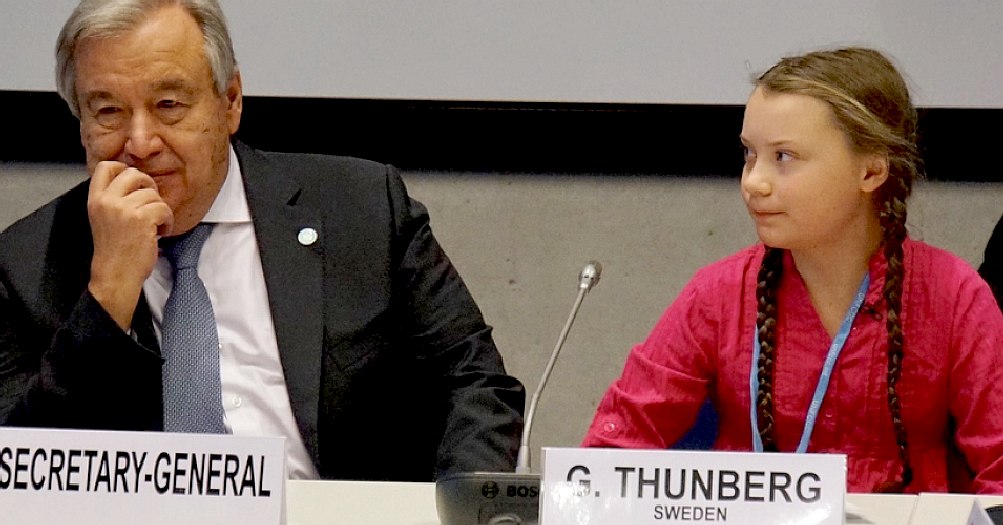
SECRETARY
GENERAL
- António Guterres
and Greta Thunberg at the COP 24 conference of the parties on climate
change. Miss
Thunberg, who is only 15 years old, is one of the new and powerful
voices of the young that are demanding climate change action, rather than
the gradual creep that will lead us to disaster. Greta helped to organise
the Skolsrtejk
Klimatet school strike that forced her elders to sit up and pay
attention. We're listening now Greta, so tell us how you think we should
proceed.
We
need to concentrate on building the infrastructure for electric
vehicles, encourage low
carbon shipping, build more wind
farms and make houses that are virtually energy self-sufficient.
These are the actions that will bring about change. The
only way to make this happen is to insist on targets that includes
programmes to deliver from each nation, with sanctions for those countries
who will not do the right thing -such as the climate
criminals Donald
Trump and Vladimir
Putin. Some environmental problems need research money to take ideas
to technology
level 9 for market.
JANUARY
1 2017
Human dignity will be “the core of my work,” says UN Secretary-General António Guterres, who took office on 1 January 2017. He believes the world body is uniquely placed to overcome global challenges and achieve
sustainable
development.
Like his predecessor Ban Ki-moon, Mr. Guterres is a great supporter of the 2030 Agenda for Sustainable Development and its set of 17
Sustainable Development
Goals, which outline a universal, integrated and transformative vision for a better world.
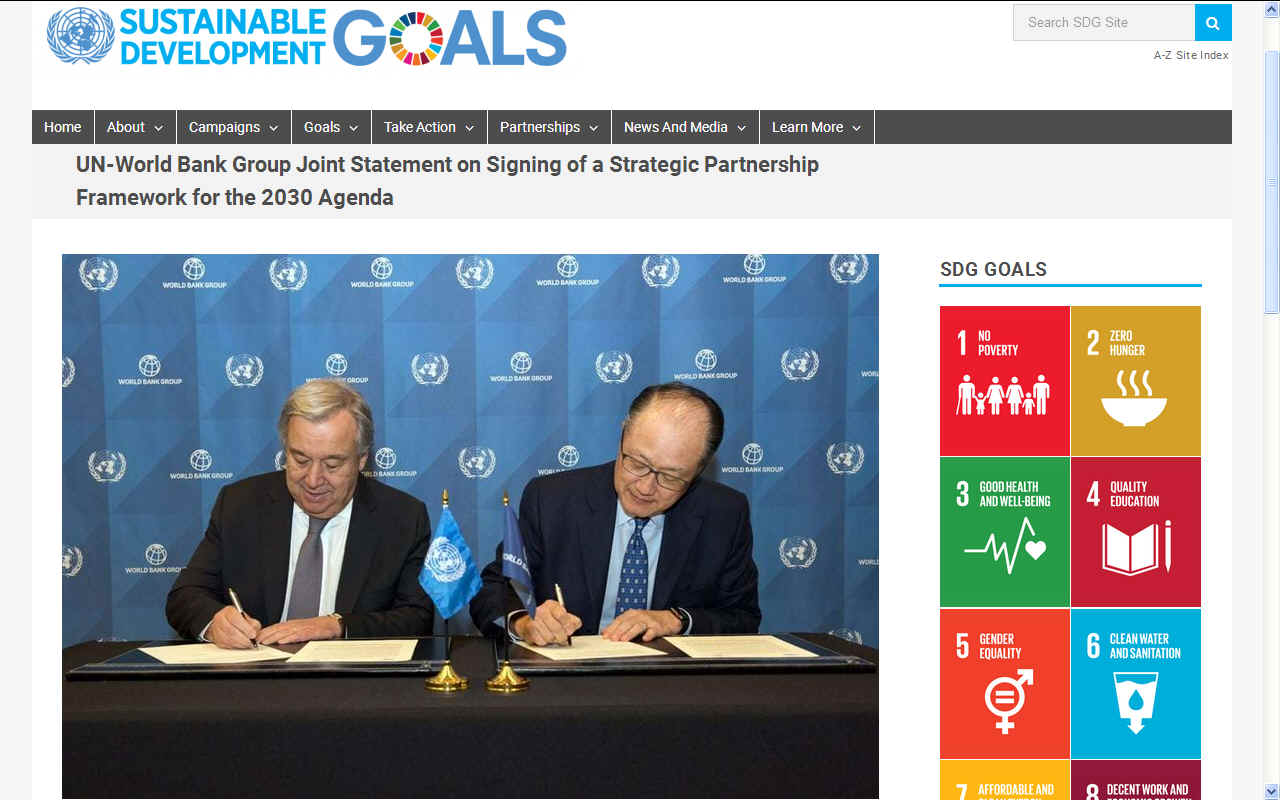
13
OCTOBER 2016
On
the 13th of October 2016 the United Nations General Assembly appointed (by acclamation) the former Prime Minister of
Portugal, António Guterres, as the next United Nations Secretary-General, to succeed
Ban Ki-moon when he steps down on 31 December.
Mr. Guterres, aged 67, was Prime Minister of Portugal from 1995 to 2002, and the UN High Commissioner for Refugees from June 2005 to December 2015. He will become the world's top diplomat on 1 January 2017, and hold that post for the next five years.
Adopting a consensus resolution put forward by its President, Peter Thomson, the Assembly acted on the recommendation on the UN Security Council, which on 6 October forwarded Mr. Guterres' name to the 193-member body as its nominee for UN Secretary-General for a five-year period, ending 31 December 2021.
Thanking the General Assembly for appointing him as the next Secretary-General, Mr. Guterres said he was grateful to the Member States for their trust in him as well as for the transparent and open selection process they undertook.
“I believe this process means that the true winner today is the credibility of the UN. And it also made very clear to me that, as Secretary-General, having been chosen by all Member States, I must be at the service of them all equally and with no agenda but the one enshrined in the UN Charter,” said Mr. Guterres.
He also underlined that alleviating the suffering of the vulnerable people, in particular the refugees and those in conflict zones, and
gender equality would remain key priorities for him during his tenure.
Secretary-General-designate Guterres also reiterated his belief in the values of peace, justice, human dignity, tolerance and solidarity, as well as his belief that diversity is a “tremendous asset” and not a threat.
Mr. Guterres also applauded the work of the current Secretary-General Ban Ki-moon and said that he would try his “utmost to honour” Mr. Ban’s legacy.
Ten years to the day after his own appointment as Secretary-General, Mr. Ban said: “Secretary-General-elect Guterres is well known to all of us in the hall. But he is perhaps best known where it counts most: on the frontlines of armed conflict and humanitarian suffering,” referring to his time as head of the UN refugee agency.
Noting that he has long valued his advice, and long admired his spirit of service, Mr. Ban declared: “He is a wonderful choice to steer this Organization as we build on the progress of the past decade, while addressing the insecurity and uncertainties of today's world.”
Frederick Musiiwa Makamure Shava, President of the UN Economic and Social Council (ECOSOC), also congratulated Mr. Guterres on his election, saying that the Secretary-General-designate “is a strong humanitarian advocate and a successful leader,” and that he looks forward to working with him.
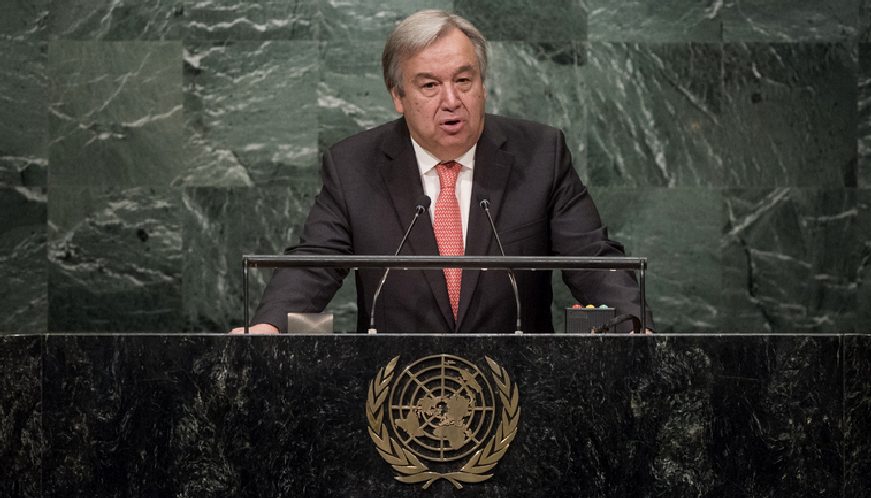
SECRETARY
GENERAL
- António Guterres
addressing the UN general assembly.
The Assembly's resolution also welcomed the historic process Member States set in motion late last year: the selection of a new
United Nations Secretary-General, traditionally decided behind closed-doors by a few powerful countries, has for the first time in history, involved public discussions with each candidate campaigning for the world's top diplomatic post.
These so-called 'informal briefings' between the candidates, UN Member States and civil society representatives kicked off on 12 April, when the first three candidates presented their 'vision statements' and answered questions on how they would promote sustainable development, improve efforts to create peace, protect
human
rights, and deal with huge humanitarian catastrophes should they be selected to lead the Organization.
Mr. Ban also praised UN Member States for the selection process and emphasized that it “opened the [selection] process to the world.”
He further noted that the new steps taken this year established a new benchmark of openness and engagement.
The selection process included, for the first time in the history of the Organization, public hearings with the General Assembly where candidates presented their vision and responded to the questions fielded by the Member States. These informal hearings were also televised and webcast.
The process started off with a joint call from the Presidents of the General Assembly and the Security Council formally soliciting candidates and from the outset, acknowledged the importance of geographic and gender balance in senior posts.
For his part, Assembly President Thomson highlighted that the selection process underscored the principles of transparency and inclusivity.
“It was a process that specifically sought out candidates who embody a firm commitment to the purposes and principles of the
[UN] Charter; who exemplify the highest standards of efficiency, competence, and integrity; and who have proven leadership and managerial abilities, extensive experience in international relations, and strong diplomatic, communication and multilingual skills,” said Mr. Thomson in his remarks.
“I am confident that Mr. Guterres will serve the global community with dedication, as a moral authority, and be the voice of our collective conscience and humanity, throughout his term,” he added.
Assuring the Secretary-General-designate of his full support throughout the present session of the General Assembly, the body’s President stressed that he would do everything within his power to facilitate a smooth transition.
In this context, Mr. Guterres will be participating in a meeting called by President Thomson, on 19 October, to discuss with the General Assembly the critical, priority and emerging issues for the global Organization.
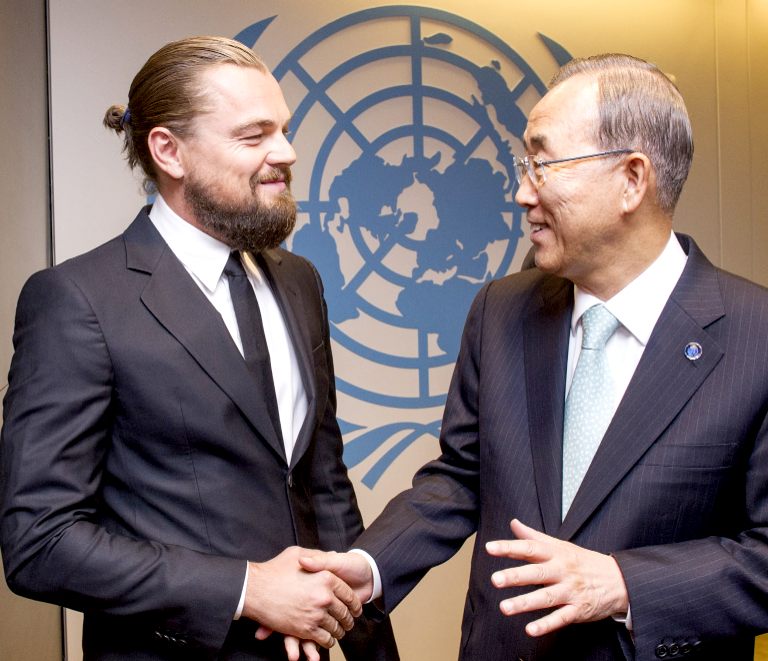
Leonardo
di Caprio and the former UN Secretary General Ban Ki-moon when they met in New York at the UN summit on
climate
change.
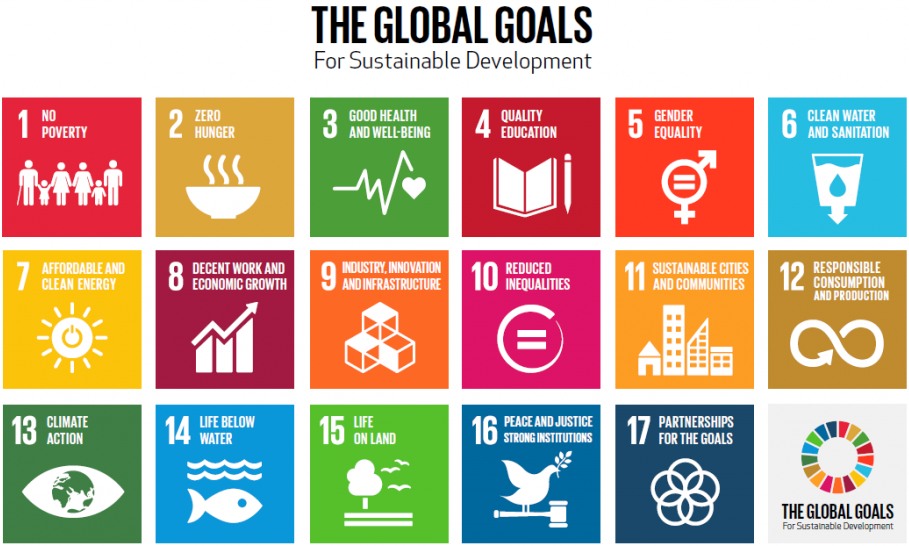
UNITED
NATIONS SECRETARIES-GENERAL
| Secretary-General |
Nationality |
Dates in Office |
| - |
- |
- |
| Trygve Halvdan Lie |
Norwegian |
1946 –
53 |
| Dag Hammarskjöld |
Swedish |
1953 –
61 |
| U Thant |
Burmese |
1962 –
71 |
| Kurt Waldheim |
Austrian |
1972 –
81 |
| Javier Pérez de Cuéllar |
Peruvian |
1982 –
91 |
| Boutros Boutros-Ghali |
Egyptian |
1992 –
96 |
| Kofi Annan |
Ghanaian |
1997 –
2006 |
| Ban Ki-Moon |
South Korean |
2007 –
16 |
| António Guterres |
Portuguese |
2017 – |
GLOBAL
OCEAN COMMISSION - CO-CHAIRS
|
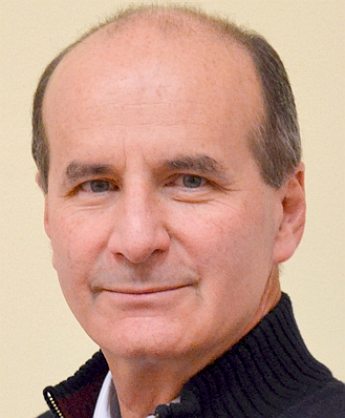
|
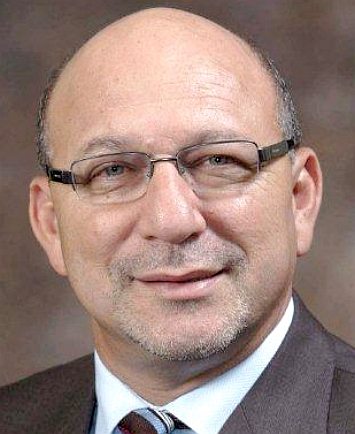
|
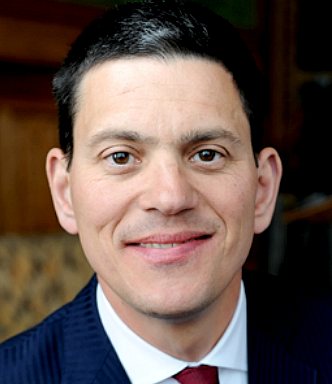
|
|
José María Figueres |
Trevor Manuel |
David
Miliband |
THE
GLOBAL OCEAN
COMMISSIONERS
|
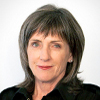
|
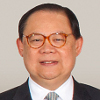
|
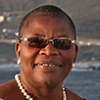
|
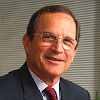
|
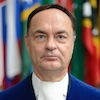
|
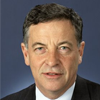
|

|
|
Carol
Browner |
Victor
Chu |
Obiageli Ezekwesili |
Luiz
Furlan |
Vladimir
Golitsyn |
Robert
Hill |
Yoriko
Kawaguchi |
|
. |
. |
. |
. |
. |
. |
. |
|
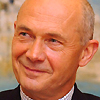
|
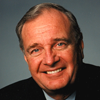
|
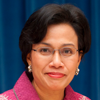
|

|
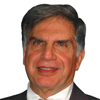
|
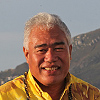
|
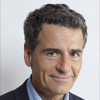
|
|
Pascal
Lamy |
Paul
Martin |
Sri
Mulyani Indrawati |
Cristina
Narbona |
Ratan
Tata |
Foua
Toloa |
Andrés
Velasco |
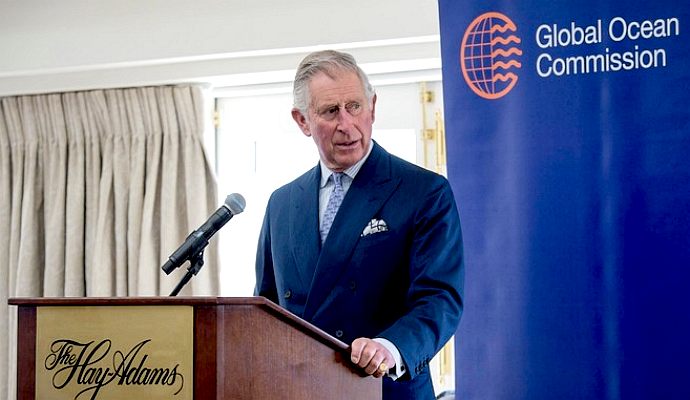
HRH
the Prince of Wales speaking at a Global Ocean Commission event in Washington DC
in March of 2015. The future King of England has consistently kept a
weather eye open to help safeguard the marine environment. Prince Charles
also met with President
Obama on this visit to the USA. The US President is quoted as saying
that climate change is one of the greatest threats to security.
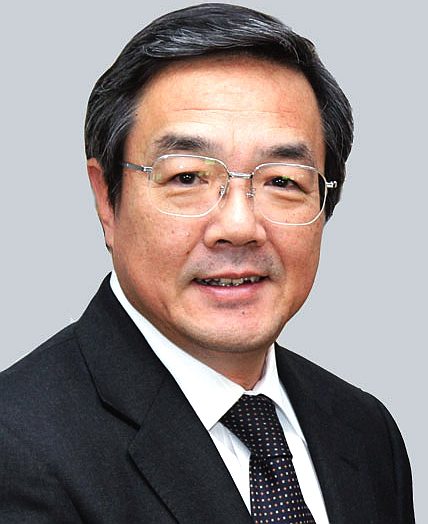
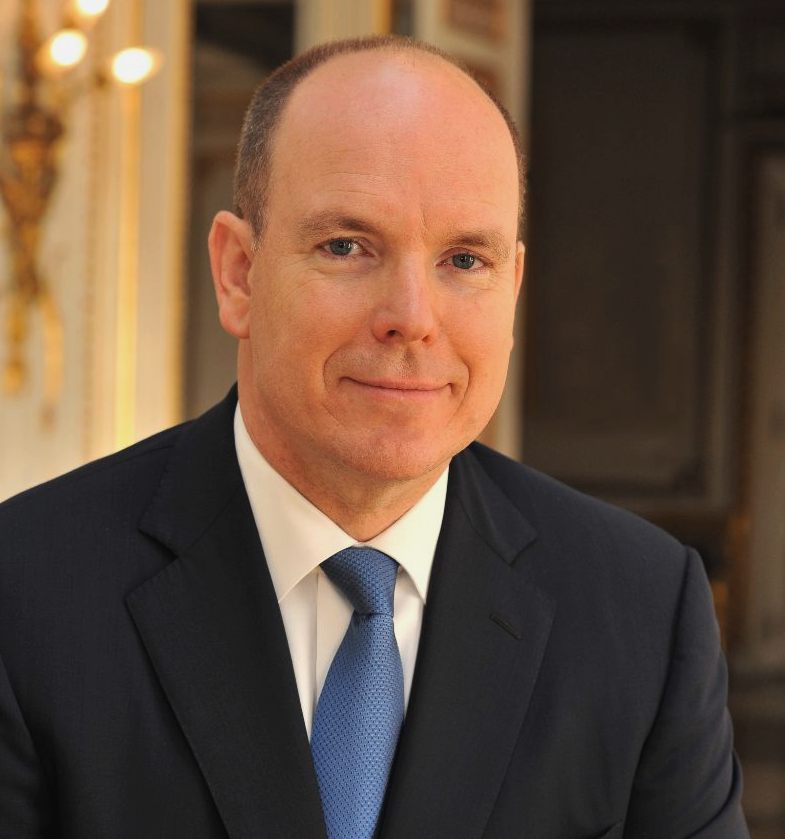
LEFT
- IMO
Secretary General: Koji Sekimizu has welcomed the recently-published report of the Global Ocean Commission
(GOC), From Decline to
Recovery RIGHT - Prince Albert II of Monaco
is a supporter of the Global Ocean Commission
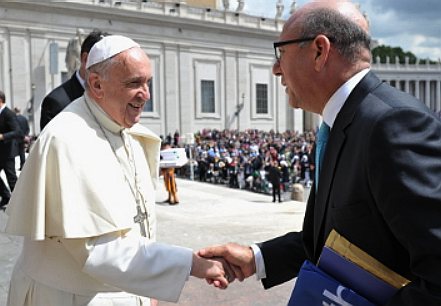
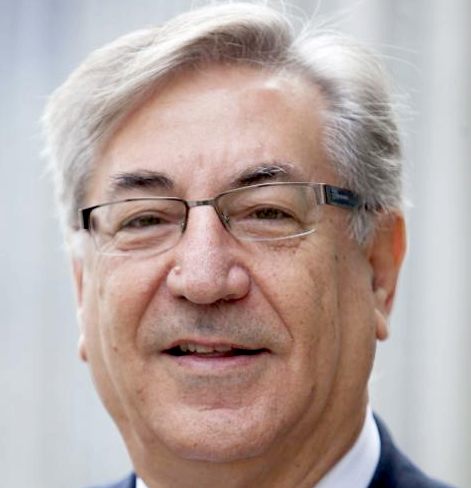
POPE
FRANCIS - Refreshingly, Pope
Francis embraces the need to tend our gardens is Christian manner, and
our duty to do what we can. He is quoted as saying: “If we destroy
Creation, Creation will destroy us.” KARMENU
VELLA - is the Commissioner for Environment, Maritime Affairs and
Fisheries at the Directorate-General for Maritime Affairs and Fisheries (also known in short as DG MARE).
The Commission is responsible for the implementation of the Common Fisheries policy and of the Integrated Maritime Policy.
LINKS
& REFERENCE
European_Commissioner_for_Maritime_Affairs_and_Fisheries
Globaloceancommission
Time
Magazine HRH Prince Charles Wales environmental ocean speech
Global_Ocean_Commission
http://www.itv.com/news/2015-03-18/prince-charles-makes-impassioned-plea-for-oceans-clean-up/
http://en.wikipedia.org/wiki/European_Commissioner_for_Maritime_Affairs_and_Fisheries
http://www.globaloceancommission.org/
http://time.com/3750375/environment-prince-charles-oceans/
http://en.wikipedia.org/wiki/Global_Ocean_Commission
http://www.itv.com/news/2015-03-18/prince-charles-makes-impassioned-plea-for-oceans-clean-up/
ACID
OCEANS - ARCTIC
- ATLANTIC - BALTIC
- BERING
- CARIBBEAN - CORAL - EAST
CHINA - ENGLISH CH
GOC
- GULF
MEXICO
- INDIAN
- MEDITERRANEAN -
NORTH SEA - PACIFIC
- PERSIAN GULF - SEA
JAPAN - STH
CHINA
PLANKTON
- PLASTIC
- PLASTIC
OCEANS - UNCLOS
- UNEP
- WWF
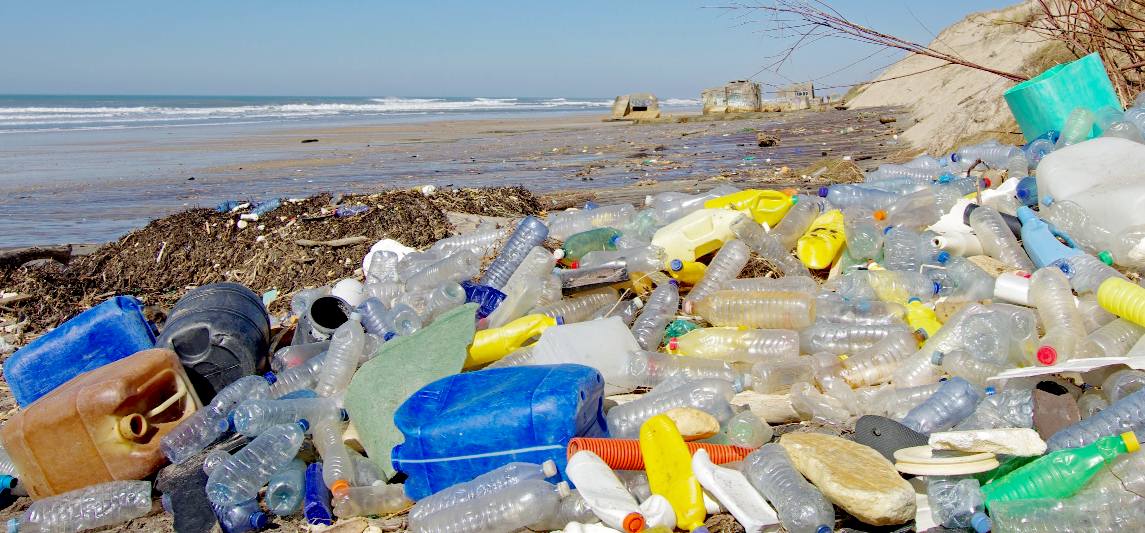
|



























